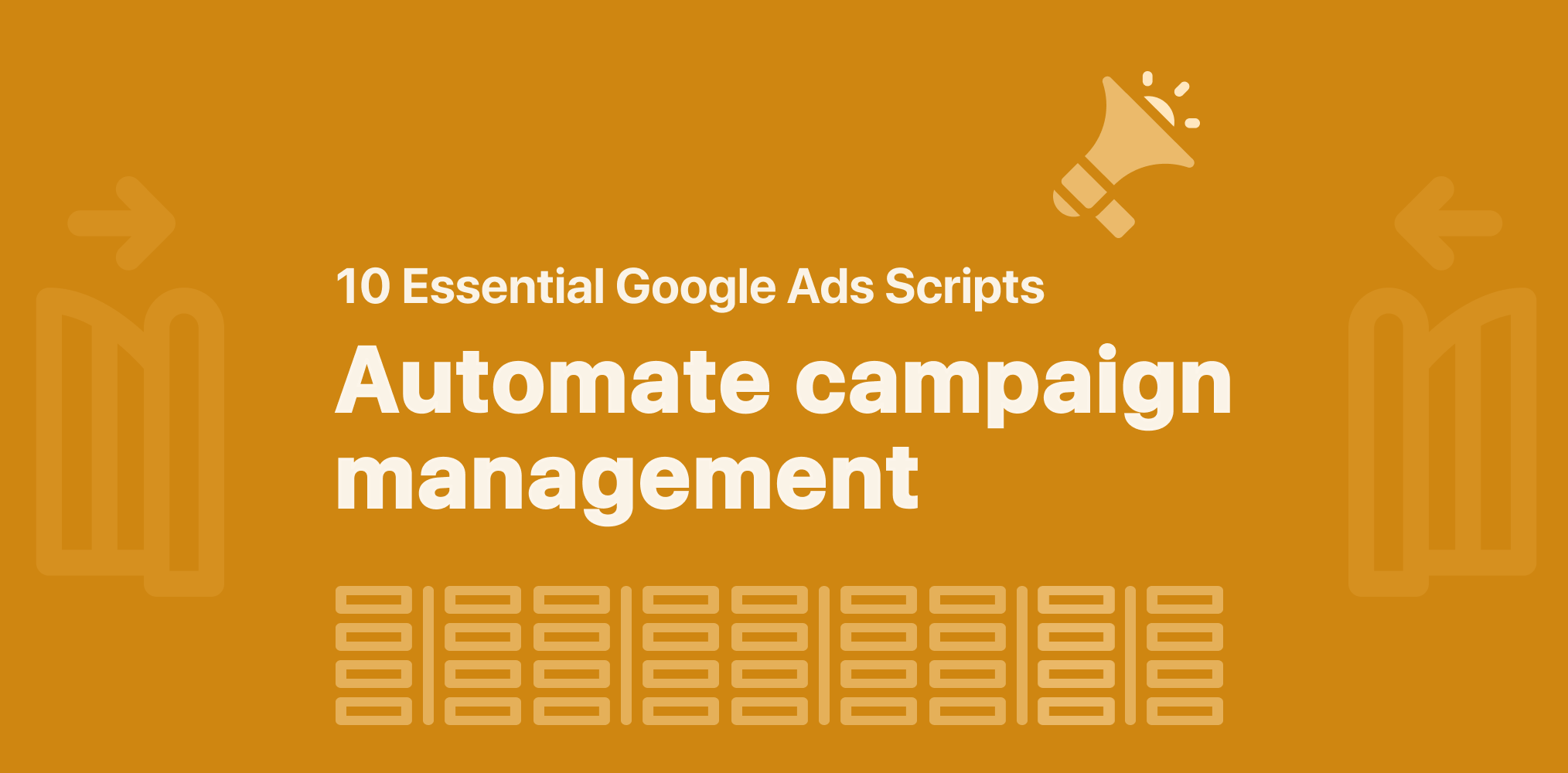
Managing Google Ads at scale can be time-consuming and complex, especially when working with multiple accounts. Luckily, Google Ads scripts allow advertisers to automate key tasks, saving hours of manual work while improving campaign efficiency.
Whether you're optimizing product listings, adjusting bids based on weather data, or analyzing search terms, these scripts can transform your advertising workflow. Below, we explore 10 essential Google Ads scripts that can help e-commerce advertisers streamline their operations.
1. Price extensions script (daily)
💡 Automates: creating and updating price assets for multiple accounts
This script reads client IDs from a master MCC sheet, creates individual client spreadsheets, and pulls product data from Google Merchant Center. It then generates price extensions (also known as price assets) and assigns them to the appropriate Google Ads ad groups—all in an automated loop.
Why it’s valuable
- Saves time by centralizing account data in a single spreadsheet
- Automatically creates client sheets when needed
- Retrieves live product pricing data
- Scales price extensions across multiple accounts without manual work
2. Price tiers script (weekly)
💡 Automates: creating price tier reports for client accounts
This script checks a Google Sheet for client IDs, copies a default template, and fills it with performance data from Google Ads and Merchant Center. It calculates key performance metrics such as CTR, ROAS, and CPA.
Why it’s valuable
- Saves time by automating data extraction
- Provides a structured pricing report for each client
- Ensures consistency in performance evaluation
3. Weather API script (daily)
💡 Automates: integrating weather data with Google Ads performance metrics
By pulling data from OpenWeatherMap, this script tracks weather conditions and correlates them with ad performance. Each client gets a daily updated Google Sheet, combining weather conditions with ad performance for deeper insights.
Why it’s valuable
- Helps analyze how weather impacts ad performance
- Enables data-driven bid adjustments based on weather trends
- Eliminates manual tracking and spreadsheet updates
4. Pause low ROI keywords (weekly)
💡 Automates: pausing underperforming keywords
This script calculates ROAS for each keyword and pauses those below a set threshold. It updates a Google Sheet with data on which keywords were paused and why.
Why it’s valuable
- Optimizes Google Ads spend by removing low-ROI keywords
- Centralizes performance tracking for easier analysis
- Reduces wasted ad spend and improves overall campaign efficiency
5. Converting search terms to ad groups (weekly)
💡 Automates: identifying high-converting search terms and creating new ad groups
This script scans search term reports for the past 7 days, identifies high-converting terms, and automatically creates new ad groups. It also labels and logs these updates in a Google Sheet.
Why it’s valuable
- Ensures profitable search terms get their own optimized ad groups
- Saves time on manual search term analysis
- Helps expand Google Ads campaigns based on real conversion data
6. Budget planning advice for search campaigns (monthly)
💡 Automates: monthly performance reporting for budget planning
This script retrieves account data, generates new performance spreadsheets, and formats them automatically. It provides budgeting insights by consolidating CPC, CTR, ROAS, and conversion data.
Why it’s valuable
- Helps plan future ad spend based on past performance
- Saves time by automating Google Ads reporting
- Standardizes performance tracking across multiple accounts
7. Product-level data shopping script (weekly)
💡 Automates: collecting product-specific ad performance data
This script creates and updates a Google Sheet with performance metrics for individual products, including impressions, clicks, conversions, and cost.
Why it’s valuable
- Provides granular product-level insights
- Helps optimize Google Shopping campaigns
- Automates performance tracking for multiple products
8. Convert DSA to exact match (weekly)
💡 Automates: converting dynamic search ads (DSA) to exact-match ad groups
By scanning DSA performance data, this script creates new exact-match ad groups from high-performing search queries, ensuring greater control over ad targeting and CPCs.
Why it’s valuable
- Reduces wasted spend on irrelevant DSA queries
- Automates the transition to exact-match targeting
- Improves ad relevance and quality score
9. N-gram analysis script (weekly)
💡 Automates: extracting and analyzing search term patterns
This script creates N-gram analysis spreadsheets, identifying top-performing keyword patterns based on 30, 90, or 180-day performance data.
Why it’s valuable
- Reveals long-term keyword trends
- Helps optimize Google Ads campaigns based on word patterns
- Saves time by automating search term analysis
10. Performance products top 50 (weekly)
💡 Automates: compiling top-performing product data from Google Shopping campaigns
This script extracts performance data for the top 50 products across client accounts, storing it in individual spreadsheets for easy analysis.
Why it’s valuable
- Helps identify best-selling products for ad prioritization
- Automates performance tracking over time
- Ensures top-performing products get more ad budget
Final thoughts
Google Ads scripts can significantly improve efficiency by automating repetitive tasks, centralizing data, and optimizing campaigns based on real-time insights. Whether you’re running e-commerce ads, search campaigns, or shopping campaigns, these scripts help eliminate manual work while improving ad performance and ROI.
If you’re looking to automate your Google Ads workflows, consider implementing these scripts and start saving time while driving better results! 🚀

